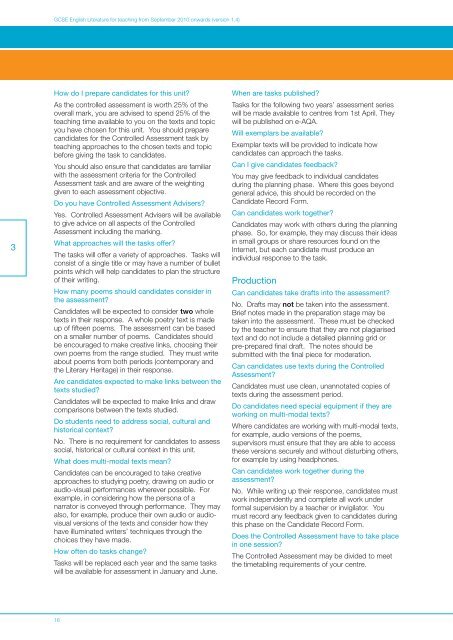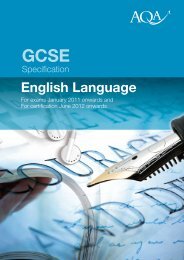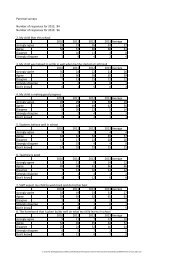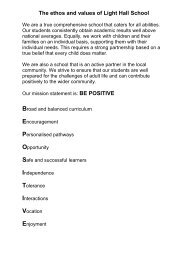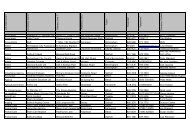AQA English Literature Specification - Light Hall School
AQA English Literature Specification - Light Hall School
AQA English Literature Specification - Light Hall School
You also want an ePaper? Increase the reach of your titles
YUMPU automatically turns print PDFs into web optimized ePapers that Google loves.
GCSE <strong>English</strong> <strong>Literature</strong> for teaching from September 2010 onwards (version 1.4)<br />
3<br />
How do I prepare candidates for this unit?<br />
As the controlled assessment is worth 25% of the<br />
overall mark, you are advised to spend 25% of the<br />
teaching time available to you on the texts and topic<br />
you have chosen for this unit. You should prepare<br />
candidates for the Controlled Assessment task by<br />
teaching approaches to the chosen texts and topic<br />
before giving the task to candidates.<br />
You should also ensure that candidates are familiar<br />
with the assessment criteria for the Controlled<br />
Assessment task and are aware of the weighting<br />
given to each assessment objective.<br />
Do you have Controlled Assessment Advisers?<br />
Yes. Controlled Assessment Advisers will be available<br />
to give advice on all aspects of the Controlled<br />
Assessment including the marking.<br />
What approaches will the tasks offer?<br />
The tasks will offer a variety of approaches. Tasks will<br />
consist of a single title or may have a number of bullet<br />
points which will help candidates to plan the structure<br />
of their writing.<br />
How many poems should candidates consider in<br />
the assessment?<br />
Candidates will be expected to consider two whole<br />
texts in their response. A whole poetry text is made<br />
up of fifteen poems. The assessment can be based<br />
on a smaller number of poems. Candidates should<br />
be encouraged to make creative links, choosing their<br />
own poems from the range studied. They must write<br />
about poems from both periods (contemporary and<br />
the Literary Heritage) in their response.<br />
Are candidates expected to make links between the<br />
texts studied?<br />
Candidates will be expected to make links and draw<br />
comparisons between the texts studied.<br />
Do students need to address social, cultural and<br />
historical context?<br />
No. There is no requirement for candidates to assess<br />
social, historical or cultural context in this unit.<br />
What does multi-modal texts mean?<br />
Candidates can be encouraged to take creative<br />
approaches to studying poetry, drawing on audio or<br />
audio-visual performances wherever possible. For<br />
example, in considering how the persona of a<br />
narrator is conveyed through performance. They may<br />
also, for example, produce their own audio or audiovisual<br />
versions of the texts and consider how they<br />
have illuminated writers’ techniques through the<br />
choices they have made.<br />
How often do tasks change?<br />
Tasks will be replaced each year and the same tasks<br />
will be available for assessment in January and June.<br />
When are tasks published?<br />
Tasks for the following two years’ assessment series<br />
will be made available to centres from 1st April. They<br />
will be published on e-<strong>AQA</strong>.<br />
Will exemplars be available?<br />
Exemplar texts will be provided to indicate how<br />
candidates can approach the tasks.<br />
Can I give candidates feedback?<br />
You may give feedback to individual candidates<br />
during the planning phase. Where this goes beyond<br />
general advice, this should be recorded on the<br />
Candidate Record Form.<br />
Can candidates work together?<br />
Candidates may work with others during the planning<br />
phase. So, for example, they may discuss their ideas<br />
in small groups or share resources found on the<br />
Internet, but each candidate must produce an<br />
individual response to the task.<br />
Production<br />
Can candidates take drafts into the assessment?<br />
No. Drafts may not be taken into the assessment.<br />
Brief notes made in the preparation stage may be<br />
taken into the assessment. These must be checked<br />
by the teacher to ensure that they are not plagiarised<br />
text and do not include a detailed planning grid or<br />
pre-prepared final draft. The notes should be<br />
submitted with the final piece for moderation.<br />
Can candidates use texts during the Controlled<br />
Assessment?<br />
Candidates must use clean, unannotated copies of<br />
texts during the assessment period.<br />
Do candidates need special equipment if they are<br />
working on multi-modal texts?<br />
Where candidates are working with multi-modal texts,<br />
for example, audio versions of the poems,<br />
supervisors must ensure that they are able to access<br />
these versions securely and without disturbing others,<br />
for example by using headphones.<br />
Can candidates work together during the<br />
assessment?<br />
No. While writing up their response, candidates must<br />
work independently and complete all work under<br />
formal supervision by a teacher or invigilator. You<br />
must record any feedback given to candidates during<br />
this phase on the Candidate Record Form.<br />
Does the Controlled Assessment have to take place<br />
in one session?<br />
The Controlled Assessment may be divided to meet<br />
the timetabling requirements of your centre.<br />
16


